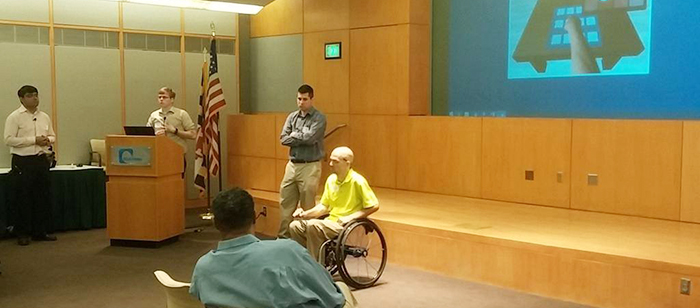CSEE research group demonstrates smart fabric for gesture recognition

CSEE Ph.D. student Alexander Nelson and faculty Ryan Robucci and Nilanjan Banerjee participated in the monthly TechBreakfast MeetUp where they demonstrated the research on developing 'invisible' sensing systems that can be embedded into fabrics.
Their Inviz system, developed in the UMBC Eclipse cluster of laboratories, uses textile-based capacitive sensor arrays and micro-doppler radars embedded into bed sheets, pillows, wheelchair pads, and clothing, for environmental control and physical therapy for such paralysis patients. The sensors detect gestures regardless of evolving environmental and patient conditions and provides explicit real-time feedback to the user. Using low-cost and ultra-low power capacitive sensing and micro-radars built into headgear, the Inviz system can reduce hospital visits and therapy costs.
You can read more about the work in a paper that was awarded the best demonstration runner-up prize at the 2015 conference on Pervasive Computing and Communications (PerCom).
Gurashish Singh, Alexander Nelson, Ryan Robucci, Chintan Patel and Nilanjan Banerjee, Inviz: Low-power Personalized Gesture Recognition Using Wearable Textile Capacitive Sensor Arrays, Proceedings of the IEEE International Conference on Pervasive Computing and Communications, IEEE, March 2015.
The Baltimore TechBreakfast is a free monthly demo-style event where entrepreneurs, techies, developers, designers, business people, and interested people see showcases on cool new technology and interact with each other. "Show and Tell for Adults" is how it's sometimes described. Each TechBreakfast begins at 8:00am and goes until 10:00am, although people usually hang around later.
Posted: May 30, 2015, 3:33 PM